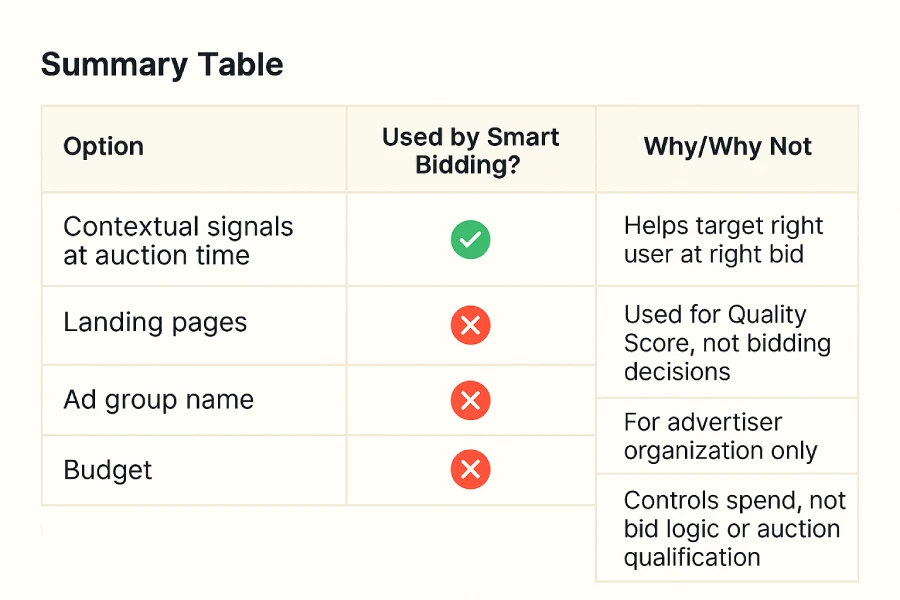I remember getting this one during my certification practice and thinking — “Broad match? Isn’t that risky?”
But when combined with Smart Bidding, broad match becomes incredibly powerful — and actually more precise than many expect. Let’s unpack what makes this combo work and why contextual signals at auction time matter so much.
Question
What’s a benefit of using Smart Bidding with broad match?
- Broad match with Smart Bidding helps make sure that you’re only competing in the right auctions, at the right bid, for the right user. It achieves this by picking up on contextual signals present at auction time.
- Broad match with Smart Bidding uses your landing pages to determine which auctions to compete in so you’re only competing in the right auctions, at the right bid, for the right user.
- Broad match with Smart Bidding uses your ad group name to determine which auctions to compete in so you’re only competing in the right auctions, at the right bid, for the right user.
- Broad match with Smart Bidding uses your budget to determine which auctions to compete in so you’re only competing in the right auctions, at the right bid, for the right user.
The correct answer is:
✅ Broad match with Smart Bidding helps make sure that you’re only competing in the right auctions, at the right bid, for the right user. It achieves this by picking up on contextual signals present at auction time.

Why correct and other incorrects?
Why is this correct?
When you use Broad Match keywords with Smart Bidding, Google Ads doesn’t just blindly show your ad for loosely related searches.
Instead, Smart Bidding analyzes real-time contextual signals like:
- Search intent
- User location
- Device type
- Time of day
- Past behavior
- Language
- Browser type
It decides at the moment of the auction:
- Whether it’s worth competing
- What bid to place
- How much value the user is likely to bring
Result:
You only compete when there’s a strong chance of a valuable conversion — saving you money and improving performance.
Why are the other options incorrect?
🚫 “Uses your landing pages to determine which auctions to compete in”
- Google uses landing pages for Quality Score and ad relevance, not for auction entry decisions.
- The choice of auction depends on user signals, not your URL.
🚫 “Uses your ad group name to determine which auctions to compete in”
- Ad group names are for your organization, not used by the system to decide where to bid.
- Google doesn’t read names like “Top Shoes Group” and base bids on that.
🚫 “Uses your budget to determine which auctions to compete in”
- Your budget limits spend, but doesn’t determine which queries or users to target.
- Smart Bidding chooses bids based on value per auction, not how much you’ve spent.

Real-life examples:
Let’s say Zane sells custom phone cases.
He uses:
- Broad match keyword:
phone case - Smart Bidding strategy: Target ROAS at 400%
A user searches:
“durable eco-friendly iPhone 14 pro case for hikers”
Without Smart Bidding, this might be ignored or result in a generic match.
With Smart Bidding + Broad Match:
- Google understands the intent.
- Realizes Zane’s eco-friendly hiking case is relevant.
- Enters the auction at the optimal bid based on the likelihood of conversion.
Zane gets the sale without overspending — even though the original keyword was just “phone case.”
Summary:
| Feature | Correct? | Reason |
|---|---|---|
| ✅ Uses contextual signals at auction time | Yes | Smart, real-time decision-making based on user intent and environment |
| ❌ Uses landing page to decide auctions | No | Landing page helps for relevance scoring, not auction targeting |
| ❌ Uses ad group name to decide auctions | No | Ad group names are organizational only |
| ❌ Uses budget to decide auctions | No | Budget controls spend, not auction targeting |
Additional Resources:
- Google Ads Help: About Smart Bidding
- Google Ads Help: About Broad Match
- Google Best Practices: Broad Match and Smart Bidding
Conclusion:
Pairing Broad Match with Smart Bidding in Google Ads lets you tap into the widest reach while staying laser-focused on the users most likely to convert.
✅ Contextual signals at auction-time = ✅ Smarter bidding decisions = ✅ Better results for your ad campaigns.
FAQs:
Q: Should I always use Broad Match with Smart Bidding?
A: If your goal is conversions or value (like Target CPA or Target ROAS), then Broad Match + Smart Bidding is a powerful combination.
Q: Can Smart Bidding still work if I use Phrase Match or Exact Match?
A: Yes, but Broad Match gives Smart Bidding the widest opportunity to find valuable searches you might not predict manually.
Q: What if I don’t trust Broad Match completely?
A: Start with a limited budget, monitor performance closely, and let machine learning optimize over time.
Now, if you are ready, then you take the Google Skillshop test for the Google Ads Search Exam. If you want more questions about the Google Ads Search Certification Exam, follow.
